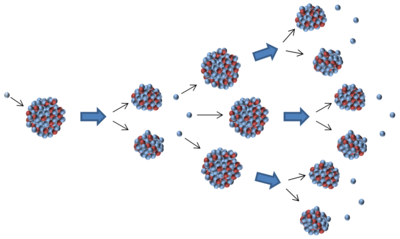Difference between revisions of "Nuclear Chain Reaction"
| Line 6: | Line 6: | ||
: For a '''nuclear chain reaction''' to occur each [[Nuclear Fission|nuclear fission]] event must cause the release of at least 1 [[neutron]] which can go on to cause a second [[Nuclear Fission|fission]] event. | : For a '''nuclear chain reaction''' to occur each [[Nuclear Fission|nuclear fission]] event must cause the release of at least 1 [[neutron]] which can go on to cause a second [[Nuclear Fission|fission]] event. | ||
: In a [[Nuclear Reactor|nuclear reactor]] on [[Mean Average|average]] 1 [[neutron]] from each [[Nuclear Fission|fission]] event goes on to cause one more [[Nuclear Fission|fission]] event. This results in a constant release of [[energy]]. | : In a [[Nuclear Reactor|nuclear reactor]] on [[Mean Average|average]] 1 [[neutron]] from each [[Nuclear Fission|fission]] event goes on to cause one more [[Nuclear Fission|fission]] event. This results in a constant release of [[energy]]. | ||
| − | : | + | : During [[Nuclear Fission|nuclear fission]] the [[neutron]]s produced usually have too much [[energy]] to be captured by the [[Atomic Nucleus|nucleus]] of another [[atom]], so they must be slowed down by a [[moderator]] to a lower [[energy]] in order for a '''chain reaction''' to occur. |
| + | : [[Neutron]]s with the right amount of [[energy]] to be captured are called [[Thermal Neutron|thermal neutron]]s because they have a similar [[energy]] to [[molecule]]s in the [[air]] at [[Room Temperature|room temperature]]. | ||
: A '''nuclear chain reaction''' can only happen if enough [[Thermal Neutron|thermal neutron]]s are produced from the [[Nuclear Fission|fission]] events. | : A '''nuclear chain reaction''' can only happen if enough [[Thermal Neutron|thermal neutron]]s are produced from the [[Nuclear Fission|fission]] events. | ||
Latest revision as of 09:44, 11 March 2019
Key Stage 4
Meaning
A nuclear chain reaction is when the neutrons released from one nuclear fission event triggers one or more other nuclear fission event.
About Nuclear Chain Reactions
- For a nuclear chain reaction to occur each nuclear fission event must cause the release of at least 1 neutron which can go on to cause a second fission event.
- In a nuclear reactor on average 1 neutron from each fission event goes on to cause one more fission event. This results in a constant release of energy.
- During nuclear fission the neutrons produced usually have too much energy to be captured by the nucleus of another atom, so they must be slowed down by a moderator to a lower energy in order for a chain reaction to occur.
- Neutrons with the right amount of energy to be captured are called thermal neutrons because they have a similar energy to molecules in the air at room temperature.
- A nuclear chain reaction can only happen if enough thermal neutrons are produced from the fission events.
| The neutrons released from one fission event go on to cause at least one other fission event in a chain reaction. |
